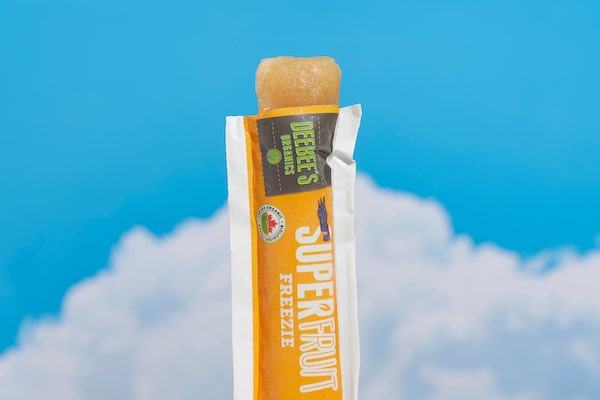Canada Pooch

Kyle Jeffers/The Globe and Mail
Only the best for man’s best friend. Jacqueline Prehogan, the founder and CEO of Canada Pooch, launched her dog clothing brand soon after adopting the first of her three rescue pugs. Faced with a frigid Canadian winter and frustrated with the sparse selection of well-made, properly fitting coats for her diminutive pup, she created a line that doesn’t sacrifice form for function. That means good fabric and inclusive sizing. Pint-sized chihuahuas and elephantine Great Danes alike have options; the brand’s largest sizes “could almost fit a small horse,” says Prehogan.
Durable doggy outerwear was the brand’s original focus, but it’s expanded to include T-shirts, hoodies and socks. There’s even a small line of apparel for humans, like dog-walking gloves with leash grips and touchscreen-friendly fingertips. (Also, matching pom-pom hats for pups and owners, because it’s true what they say about eventually looking alike.) Product development is built on the idea that dogs are our kin, and we should clothe them accordingly. “They deserve products made with the same care and quality that we expect for ourselves,” says Prehogan. The company’s warm ethos clearly resonated with dedicated pet parents—a decade after launch, Canada Pooch products are sold in 5,000 stores across Canada and the U.S.
Tru Earth

If you’re going to sell an eco-friendly product, it had better work as well as its unfriendly alternative. If not, it will fade into irrelevance. So it’s not surprising that Brad Liski, a co-founder of Tru Earth, wasn’t initially excited about the idea of a laundry detergent sold as a solid strip in an iPhone-sized package.
Then he tried the product, which has been patented by a member of his extended family. The strips worked so well he teamed up with his friend Ryan McKenzie, and McKenzie’s friend Kevin Hinton, to bring the product to market. They thought 150 subscription orders in their first month would get them started; they ended up with 1,500. The strips are eco-friendly in multiple ways. They not only nix the plastic of clunky plastic bottles, but because they weigh so little (less than three grams per strip), they’re much less fuel-intensive to ship. And this isn’t greenwashing—the product is demonstrably less wasteful than traditional detergent. “Our competitors are focused on manufacturing and productivity,” says Liski. “Tru Earth is focused instead on the quality and usability of our product and on reducing the environmental impact caused by its transportation.”
Artika for Living

The internationally bestselling book on Danish coziness—The Little Book of Hygge—made a big deal about lighting. We can’t be cozy, the authors argued, if our home’s lighting scheme is off. The recent growth of Montreal-based lighting company Artika for Living speaks strongly to the truth behind this idea. As people around the world cocooned in comfort to stave off pandemic-era blues, Artika opened a new warehouse that doubled its storage capabilities. Revenue has grown by 20% over the pandemic, which is significant for a company that’s been around for 14 years. Artika started with a focus on candles (which, by the way, are also repeatedly emphasized in hygge) and homewares, and it’s since grown to specialize in durable, well-priced lighting fixtures. A new line of smart lights interacts with voice assistants—nifty in an age where we’re increasingly wary of touching things. “Artika product development is all about search and optimization,” says CEO and co-founder Marc Couture. “We search for ideas around the globe in our industry and others, and we adapt with better performance, cost and user experience.” With 50 patents, 300 products and sales in more than 20 countries, it seems like they’ve got the right approach.
Country Chic Paint

Anyone with a Pinterest account knows that refurbished thrift-store finds are improved by a sleek paint job. Country Chic Paint—a company focused on the DIY market—offers perfect options to aid consumers who’d rather not have their next dresser come in a flatpack from a global behemoth. There’s a broad enough—but non-intimidating—range of 55 colours, from muted neutrals to zingy brights, and a helpful menu of “colour recipes” for mixing new shades. All are matte and “chalk-style,” which not only yields a rustic shabby-chic result but helps the paint go on smooth with minimal prep.
The company launched in 2014 but saw a serious swell of interest over the pandemic, when we all had time to wonder if better furniture could make us happier to be stuck inside. The founders, husband-and-wife team Jan and Rosanne Korteland, attribute their success to good listening skills. “Product development takes a very collaborative approach at Country Chic Paint,” says Rosanne. “Our customers share what they’re looking for in a particular product, and then we work toward creating the product they want to buy.”
RBR Ltd.

Build super-precise technical equipment and make it easy for humans to use: Those are the principles at the core of RBR’s strategy for developing oceanographic instruments. “When RBR moves, we move fast, and our customers know that we always put their best interests first,” says company president Greg Johnson. “That leads naturally to a continual stream of new developments that enhance the line of instrumentation we manufacture.” Those tools need to function everywhere from the deepest parts of the ocean to the polar ice caps—in other words, inhospitable places where reliability is critical, and user-friendliness isn’t just a nice-to-have.
Ocean health is a key indicator for climate change, which affects water temperatures, pH, salinity and dissolved gases, among other features—all of which are measured by RBR instruments. And its products are built on a modular platform; components can be readily swapped out to fulfill researchers’ specific needs.
DEEBEE’S ORGANICS

Dr. Lionne Laslo-Baker, the founder and CEO of Deebee’s Organics, is probably exactly the kind of person you want making food for your kids: she’s a medical researcher and an expert on how toxins in the food chain affect child health. Watching her kids experiment in the kitchen one day, Laslo-Baker decided to start a line of snack products she’d feel comfortable serving to her own family. But she was also attuned to the virtues of convenience and wanted a snack that was as easy to deploy in busy moments as it is nutritious. She opted for freezies, a product reliably beloved by little ones and mercifully free of prep time.
As you might expect, her freezies are 100% organic fruit—no artificial flavours, colours, preservatives, or any of the top eight allergens that cause worry for parents. They have a remarkably smooth feel, thanks to a special texturizing process. “We like to say we’re expanding our kids colour ‘palates’ by teaching them that real food can be really fun,” says Laslo-Baker.
Your time is valuable. Have the Top Business Headlines newsletter conveniently delivered to your inbox in the morning or evening. Sign up today.